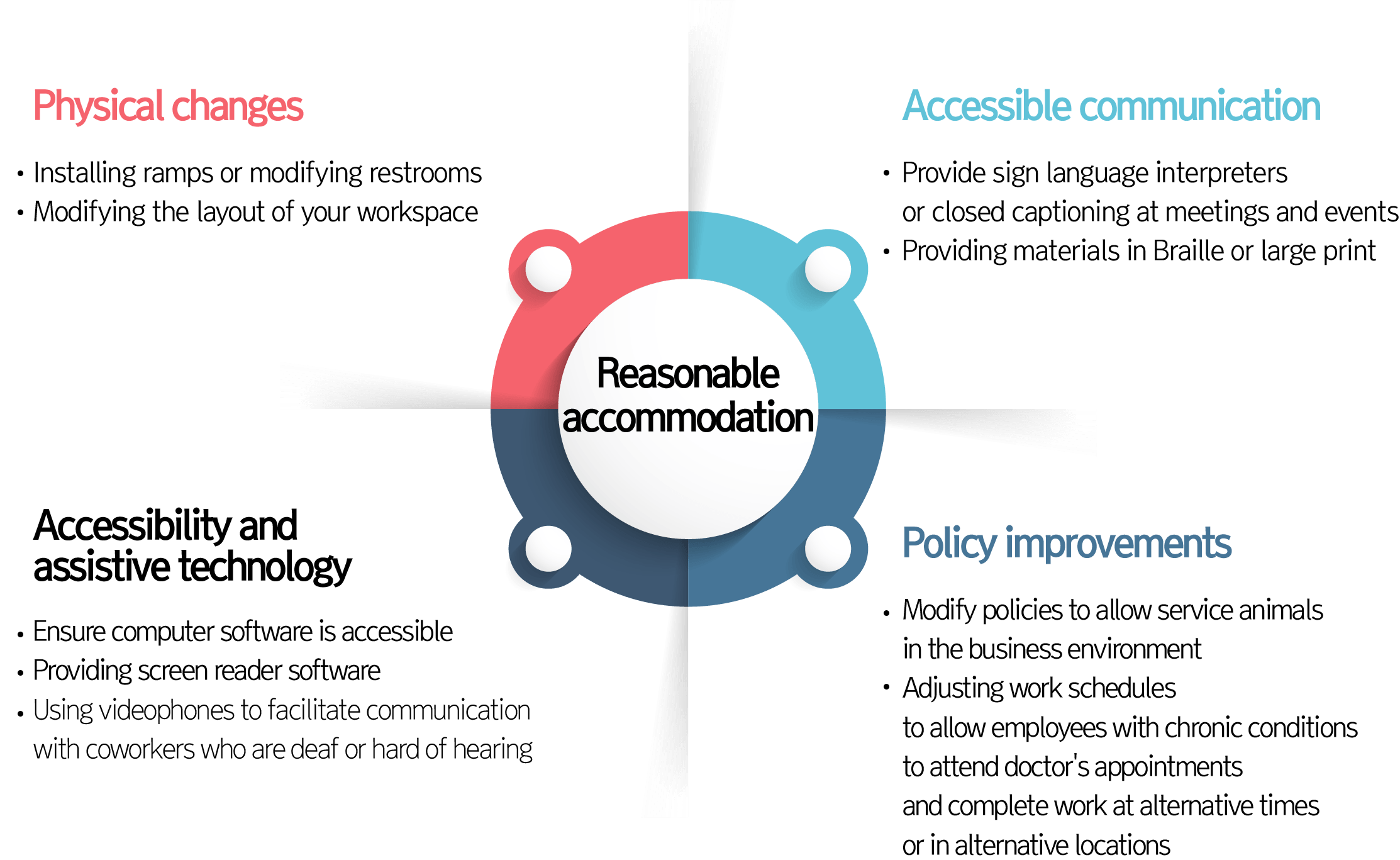considerate: to help or care for.
Standard Korean Unabridged Dictionary.
Consideration and Reasonable Accommodation
In order for people with disabilities to do their jobs, they often need to be accommodated outside of work. Adjustments in communication, scheduling, or environmental factors can be made to allow a person with a disability to work to the best of their ability.
This is called Reasonable Accommodation. Reasonable accommodation means necessary and appropriate modifications and adjustments that do not impose a disproportionate or undue burden, where necessary in a particular case, to ensure that a person with a disability can enjoy or exercise all human rights and fundamental freedoms on an equal basis with others.

The Korean Act on the Prevention of Discrimination and Remedy of Rights of Persons with Disabilities (ADA) also clarifies the obligation to provide accommodations.
Article 11 (Obligation to provide reasonable accommodation) ① An employer shall provide reasonable accommodation as follows so that a person with a disability can work under working conditions equal to those of a person without a disability in performing his or her job. <Amended 2016. 2. 3.> 1.
1. installation or modification of facilities and equipment
2. modification or adjustment of working hours for rehabilitation, functional assessment, treatment, etc.
3. providing training or making accommodations in training
4. changes to instructional manuals or reference materials
5. improvements to the testing or evaluation process
6. installation and operation of auxiliary aids such as screen reading and magnification programs, Braille terminals, magnification readers, print-to-speech printers, and the provision of auxiliary aids such as readers, Korean sign language interpreters, etc.
⓶ The employer shall not assign a person with a disability to another job against the will of the person with a disability without a justifiable reason.
⓷ The details of the reasonable accommodation that an employer must provide pursuant to Paragraph (1) and the scope of the steps to be applied at the workplace shall be determined by presidential decree.
Such reasonable consideration is essential to minimize the inconvenience of persons with disabilities at work. It is especially important to have a detailed discussion with the person with a disability or a close caregiver about what support is needed. There are many different ways that disabilities can manifest themselves. The same type of disability can often manifest itself in different ways, and even the same symptoms can vary in severity. Even primary caregivers don’t know the full range of challenges a person with a disability faces, which is why discussing and coordinating support needs is essential for both the person with a disability and the organization.
Rethinking what it means to care
I have an acquired brain lesion disorder. Thankfully, I’ve been able to navigate the workplace with appropriate accommodations. This has been accompanied by support tailored to my individual needs, including reduced hours, modified and adjusted hours, and partial telecommuting, all of which have been made possible through good consultation and understanding. There is also ongoing feedback to ensure that we are in sync.
Here’s a personal and simple example from my life. I have a brain lesion disorder, which affects me in many ways, but unstable balance is the one that affects me the most in real life. I can walk on flat surfaces, but I need to be careful on uneven ground or slopes, and handrails and grab bars are essential when navigating stairs. However, even when walking on flat surfaces, I need to focus my attention on keeping my balance, if not at a moderate speed and in a constant direction. If you walk too slowly, your body won’t be able to keep up with the center of gravity, which shifts due to inertia, and you’ll need extra time to correct your balance; if you walk too fast, it’s almost impossible to control your nerves and muscles. This is also true when walking up and down stairs with assistance.
However, when walking with a person with a disability, people usually consider it considerate to walk slower. It’s hard for people without disabilities to realize that walking too slowly is also uncomfortable, so I always kindly remind them that they can walk at a normal pace. The other person is then relieved, and we both feel more comfortable.
Isn’t that what “caring” is all about, knowing what the person wants and giving them the right support? If you find yourself rationalizing that you’re being considerate by giving the disabled person support that they don’t really need, you might want to rethink what you mean by consideration.
This isn’t just about people with disabilities. It’s important for everyone to give others the consideration they want, and what you consider consideration may not be consideration for someone else. Similarly, what is socially acceptable may not be acceptable to someone with a disability. Reasonable accommodation can only be achieved through constant communication.



![Read more about the article [The Valuable 500] Disability-Friendly Policies Through the Eyes of Google](https://knda.ne.kr/wp-content/uploads/2024/05/제목을-입력해주세요_-001-1.png)
